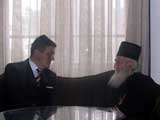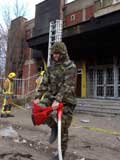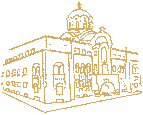|
|
NEWS
Information Service of
the Serbian Orthodox Church
March 24, 2004

PRESIDENT
MAROVIC VISITS PATRIARCH PAVLE
 (BELGRADE)
- 24 March 2004 - His Holiness Serbian Patriarch Pavle, together
with His Eminence Metropolitan Amfilohije of Montenegro and the
Littoral, a member of the Holy Synod of Bishops, and the Patriarch's
closest co-workers, received today in the Patriarchate in Belgrade,
Mr. Svetozar Marovic, President of the State Union of Serbia and
Montenegro, together with his entourage. (BELGRADE)
- 24 March 2004 - His Holiness Serbian Patriarch Pavle, together
with His Eminence Metropolitan Amfilohije of Montenegro and the
Littoral, a member of the Holy Synod of Bishops, and the Patriarch's
closest co-workers, received today in the Patriarchate in Belgrade,
Mr. Svetozar Marovic, President of the State Union of Serbia and
Montenegro, together with his entourage.
Mr.
Marovic familiarized His Holiness with the domestic and international
action undertaken by the State Union for the defense of the Kosovo
and Metohija Serbs, as well as quelling the most recent terrorist
attacks on their lives, shrines and homes.
During
the conversation it was noted that there is a need to advance
the cooperation between the Serbian Orthodox Church and the State
Union.

POLICEMEN
KILLED IN KOSOVO ATTACK
 UN
police officer and a local policeman have been killed in Kosovo,
local police and the UN say. The two were shot dead in their UN
vehicle in the village of Luzane, north of the capital, Pristina. UN
police officer and a local policeman have been killed in Kosovo,
local police and the UN say. The two were shot dead in their UN
vehicle in the village of Luzane, north of the capital, Pristina.
Kosovo
in Serbia, last week saw some of the worst ethnic clashes in more
than four years, in which 28 people died.
The
incident comes on the fifth anniversary of the Nato air strikes.
Hundreds of others from both Serbian and ethnic Albanian communities
were injured in last week's clashes after the violence started
in the divided town of Mitrovica.
As
the clashes spread across the province, more than 3,000 Serbs
fled their homes and churches attacked by ethnic Albanian mobs.
Nato rushed in 2,000 more troops to help quell the violence. According
to a UN police spokesman, the ambush took place after dark on
Tuesday evening. A clearly marked UN patrol car with three officers
and an interpreter
was travelling south towards Pristina from the town of Podujevo.
It came under fire in a rural area from at least one gunman and
crashed into the hillside, killing the two police officers.

INDEPENDENT:
ALBANIANS HAVE STOLEN EVERYTHING. TVS, TELEPHONES, FURNITURE,
EVEN CLOTHES'
Kosovo
was mourning the murders, looting and arson that shattered the
fragile reconciliation process of the Albanian and Serbian communities
when the Nato secretary general flew in this week to declare that
such violence would not be tolerated again. But for Radojka and
Ljiljana, two women driven with their families from their homes
in the capital, Pristina, by a baying mob, all that meant nothing.
Huddled in the sports hall of a school in Gracanica - one of the
few remaining Serbian enclaves in the former Yugoslav province
- they were angry, confused and full of foreboding. These were
among 1,200 Serbian civilians "cleansed" from their
homes in the towns and villages by Albanians and now herded into
makeshift refugee centres.
Neither
woman wanted to give her surname because they feared retribution.
"It is the second time that I have had to run away like this,
hiding, frightened for our lives,'' said Radojka, 41. "After
the war in 1999 I fled with my husband and children from L¼ubljana
to Pristina. We thought things were getting better, and we were
safe there. Now this has happened. I don't know what is going
to happen to us, but I cannot face a third time of this. We cannot
go back to our homes, it is simply not safe there.'' Radojka,
her 49-year-old husband, Mirko, and their three children were
at home in the YU Apartments in the centre of Pristina, inhabited
solely by Serbs, when a crowd of about 2,000 surrounded the building
about 5pm on Wednesday. For the next eight hours they and their
neighbours were besieged by groups of men hurling bricks and Molotov
cocktails. The attackers broke down the doors and attacked many
with knives and baseball bats. Dozens were injured, and at least
one man, Dragan Smiliavic, a United Nations official, is critically
ill with stab wounds. The Serbs were eventually rescued by a unit
of Nato's Kosovo Force. Some are now at Slim Line, the military
barracks in Pristina where the newly arrived British troops have
also taken up residence. Others are at Gracanica, among 10,000
fellow Serbs. Ljiljana, 40, her 44-year-old husband, Zoran, and
their five children were also part of the exodus. She, too, does
not want to go home. "What is the point? They have stolen
everything, TVs, telephones, furniture, even our clothes. A policeman
has been to our flat, and he said there is nothing left. What
they had not taken, they had smashed,'' said Ljiljana. "It
is all very well for Nato to say now that they have sent more
troops. But they were not there when we needed them. And they'll
leave in a few weeks' time. If we go back to our homes, who will
protect us then?'' A representative of the United Nations mission
in Kosovo came in with photographs of the refugees' homes, many
of them burnt after being ransacked. A frail woman of 82, sitting
rocking on a camp bed, stared at the photograph in her hand and
would not let go. "She has no family. They smashed down her
door and got in. Will you send her back for another experience
like that?'' a Serbian Red Cross official asked.


Copyright © 1999-2004 by
The Information Service of
the Serbian Orthodox Church
11000 Belgrade
Kralja Petra I no.5
+381 11 3282 596
e-mail
|

